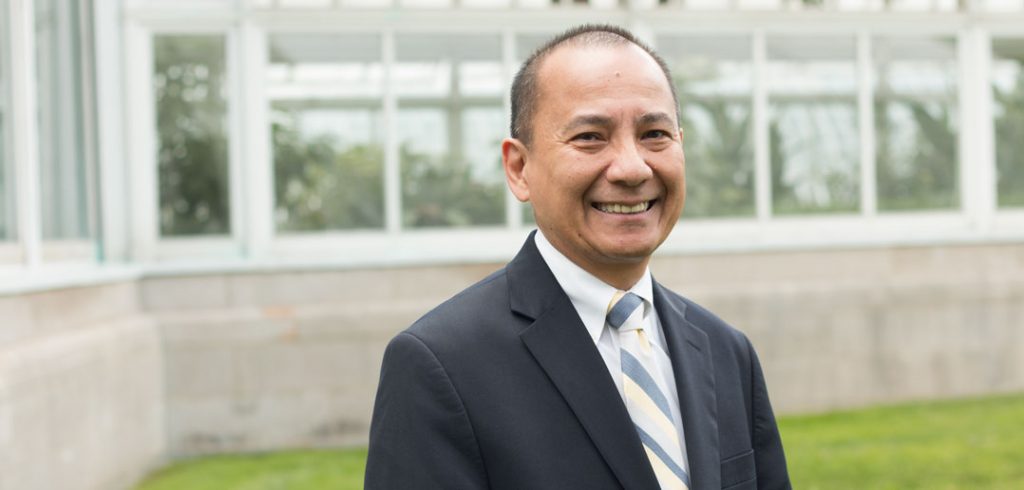“Sometimes when we talk about humanity, we have a very limited construction of what it is, and it’s limited by the extent to which we have engaged with the human family,” said Cruz, who has visited more than 50 countries, including South Africa, Germany, and Japan. “If there is one thing that I, as an educator, would like to pass on or inspire others to consider, it is for them to experience the world.”
Cruz, who was born and raised in Manila, Philippines, came to Fordham on July 1 after serving as associate dean of academic affairs in the School of Theology and Ministry at Seattle University. Recently, he has facilitated partnerships between GRE and international universities in Asia and Europe.
On May 28, GRE signed an agreement with De La Salle University (DLSU) in Manila, which currently offers the only Ph.D. in religious education in Southeast Asia. In addition to fostering the exchange of academic publications and scholarly information, the agreement would give qualified DLSU students the opportunity to study at GRE beginning this fall. A month before partnering with DLSU, Fordham signed a similar memorandum of understanding with the Pontifical Catholic University of Croatia in Zagreb. For many years, Fordham has also partnered with Ateneo de Manila University, a Jesuit university, as part of its study-abroad program, which Cruz said he is hoping to strengthen in the coming months as GRE collaborates more closely with Ateneo de Manila’s Formation Institute of Religious Education.
Why is it important for spiritual or religious leaders to “experience the world”?
The more we experience the world, the more we experience humanity. I think empathy is what the leadership of today needs—the ability to be in another person’s shoes, to discern and make decisions that are mindful of the different faces to whom we’re accountable. This really is a question of accountability. I always ask students what their communities of accountability are because leadership education, ministerial formation, and pastoral ministry aren’t personal practices. They are communal practices for the transformation of church and community, not only of individuals.
How did your own experiences traveling the world and ministering to different communities inform your perspective on global education?
As an immigrant, I’m very aware of insider-outsider relationships. I’m very attentive to dominant-minority relationships. I’m very sensitive about who’s not around the table in conversations and decision-making. In the classroom, I’ll purposely ask the question: Who should be in the classroom with us right now? And what might be some of the reasons for which they are not? A constitutive part of faith-based leadership is a deep awareness that there are people making decisions that affect other people’s lives. In response, faith-based leadership ensures that we claim the agency, which allows us to participate actively in discernment and decision making.
What do you think is unique about this period in history that requires leaders to be culturally responsive?
A lot of our challenges today are grounded in religious conflict. The more we learn about the religious and spiritual lenses that we use to understand our daily lives and struggle, the more we can understand our neighbor. Religiously, it is shifting from a posture of stranger to neighbor. We make a stranger a neighbor by understanding intentionally what it is in their religious socialization or cultural upbringing that makes them act the way they do. There is no better time than today to make use of our religious resources to understand current events—like the refugee crisis, human trafficking, and the removal of immigrant children from their undocumented parents.
How do you think Fordham’s partnerships with De La Salle University and the Pontifical Catholic University of Croatia align with your vision for GRE?
I personally chose the Pontifical Catholic University of Croatia because it is 10 years old. An emerging university is a vulnerable community. This is a good partnership, particularly in pastoral counseling and spiritual care, because of what Croatia and neighboring countries have recently experienced. They are still going through the effects of trauma. They are still recovering from of the traumatic effects of war. They would provide a broader perspective on how trauma affects people outside of America. I hope this will widen our students’ perspectives about what the human reality is all about.
De La Salle University is one of the largest research universities in the Philippines and they are also the home of the Religious Educators Association of the Philippines, with very comparable focus to GRE. For us, the focus is on global education and what the multiple practices of religious education are in that part of the world.

